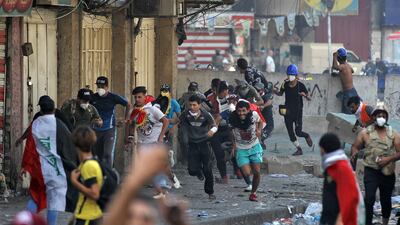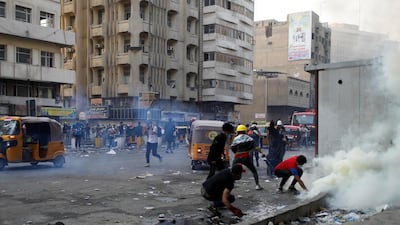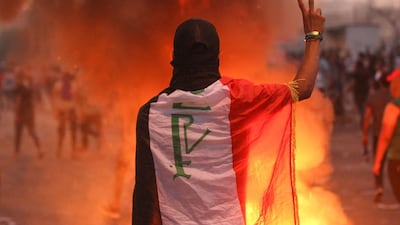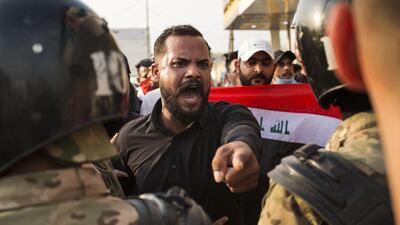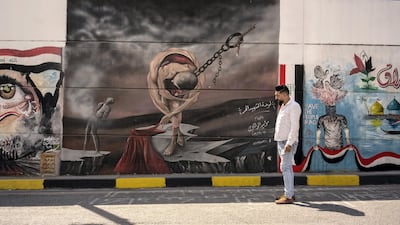A year in, Iraq’s protest movement has yet to achieve its aim of wholesale political change and risks being snuffed out by widespread violence and intimidation at the hands of the security forces and militias coupled with the Covid-19 pandemic, experts and activists say.
Since last October, thousands of Iraqis have taken to the streets to demand the replacement of the political system that has left public services crumbling and overseen the rise of overwhelming corruption. Their demands were met with live fire and deadly force.
Nearly 600 protesters have been killed, dozens kidnapped and tens of thousands left with life-changing injuries, but little has changed on the ground.
While the movement – and ultimately, the violence that faced it – forced the resignation of prime minister Adel Abdul Mahdi, little systemic change has been made.
"Not much has changed, accountability for those killed have not been made, electoral law has not changed in the way we would have hoped, we wanted to put an end to the sectarian divides in parliament. We've not seen any deep-rooted changes," Inas Jabbar, a human-rights activist from Baghdad told The National.
While protesters managed to maintain momentum in the face of bullets and teargas, by the time the global pandemic forced the government to order people to stay home in mid-March, momentum was waning.
“There is a willingness from the public to re-engage in the movement, but threats, assassinations and coronavirus have impacted and reduced its momentum,” Ms Jabber said.
She participated in last year's protests and said ahead of the anniversary that demonstrators would be back in Tahrir Square, the epicentre of Baghdad's rallies on Thursday to mark the anniversary because the government has not met their demands.
Protesters called for sweeping changes to Iraq's political system, put in place after the 2003 US-led invasion of Iraq.
The May election of Prime Minister Mustafa Al Kadhimi, who says he wants to implement the changes demanded on the streets and hold early elections, broke the political deadlock.
But, experts warn that he will not be able to deliver the systemic shift many on the street want to see.
“The Iraqi situation is beyond a place where incremental reform could work,” said Renad Mansour, senior researcher and Iraq expert at the London-based Chatham House said.
Neither the government nor political parties have been able to respond to the public’s needs, so Iraqis will continue to protest he said.
"They haven't addressed the roots of the Iraqi state that these protesters are rising up against. So, until they are addressed, changing a person or a post here or there, won't work," Mr Mansour told The National.
While the demands on the street are numerous, one issue that highlights the difficulty Mr Al Kadhimi faces is in compensating the families of protesters killed or wounded by security forces or prosecuting officers responsible.
“The government has not even compensated those injured by security forces, there has been little contact made with them,” Ms Jabbar said.
Delivering accountability is even more of a challenge because those responsible are protected by the security forces or have powerful political cover, Lahib Higel, Crisis Group's senior analyst for Iraq, told The National.
Such has been the crackdown and internal divisions, the expert says it is unlikely Iraq will see demonstrations on the scale of the peak of the movement.
“One reason is that protesters have different visions for how to carry on the struggle. Another is the violence and intimidation that many mobilisers have faced,” she said.
But Belkis Wille, a senior crisis and conflict researcher at Human Rights Watch, said protesters today have an even more reason to take to the streets than they did a year ago. While the movement was initially powered by anger at the system’s failings, there is now the anger at the killing of demonstrators and the government's inability to hold the perpetrators to account while still failing to pass reforms.
"The question is going to be whether this government is able to control the security forces across the country and ensure respect for the protesters' safety. And we don't yet know the answer to that," Ms Wille told The National.
While the pandemic and violence appeared to reduce the numbers taking to the streets each week, Toby Dodge, an Iraq expert at the London School of Economics, told The National, said that the protests have already returned but are more geographically diffused across the south and no longer centrally focused on downtown Baghdad.
“They could well explode again on the October anniversary. But they are not yet as strong as last year because of the sustained, mostly covert, violent repression delivered by the militias,” he said.
This campaign of repression has broken up the protest leadership but, along with Covid-19, has also discouraged all but the most tenacious from taking to the streets, Mr Dodge said.
Raid Madhaa, a protester whose murals in Tahrir Square became a symbol of the protests, said the demonstrations started to disintegrate in February following the outbreak of coronavirus and was derailed by infiltrators.
"They really ruined the movement, a friend of mine was going to get killed because of the infiltrators. People are in two minds when it comes to participating this year – they are worried about their safety and feel that their voices are not heard," Mr Madhaa told The National.
“I’ll be there on Thursday, but will be monitoring the situation from far away because there is a lot of uncertainty as to what will happen this week,” he said.
The specs
Engine: 2.0-litre 4-cyl turbo
Power: 247hp at 6,500rpm
Torque: 370Nm from 1,500-3,500rpm
Transmission: 10-speed auto
Fuel consumption: 7.8L/100km
Price: from Dh94,900
On sale: now
UAE currency: the story behind the money in your pockets
The specs
Engine: 1.5-litre turbo
Power: 181hp
Torque: 230Nm
Transmission: 6-speed automatic
Starting price: Dh79,000
On sale: Now
Lexus LX700h specs
Engine: 3.4-litre twin-turbo V6 plus supplementary electric motor
Power: 464hp at 5,200rpm
Torque: 790Nm from 2,000-3,600rpm
Transmission: 10-speed auto
Fuel consumption: 11.7L/100km
On sale: Now
Price: From Dh590,000
What are the influencer academy modules?
- Mastery of audio-visual content creation.
- Cinematography, shots and movement.
- All aspects of post-production.
- Emerging technologies and VFX with AI and CGI.
- Understanding of marketing objectives and audience engagement.
- Tourism industry knowledge.
- Professional ethics.
RESULT
Deportivo La Coruna 2 Barcelona 4
Deportivo: Perez (39'), Colak (63')
Barcelona: Coutinho (6'), Messi (37', 81', 84')
Which honey takes your fancy?
Al Ghaf Honey
The Al Ghaf tree is a local desert tree which bears the harsh summers with drought and high temperatures. From the rich flowers, bees that pollinate this tree can produce delicious red colour honey in June and July each year
Sidr Honey
The Sidr tree is an evergreen tree with long and strong forked branches. The blossom from this tree is called Yabyab, which provides rich food for bees to produce honey in October and November. This honey is the most expensive, but tastiest
Samar Honey
The Samar tree trunk, leaves and blossom contains Barm which is the secret of healing. You can enjoy the best types of honey from this tree every year in May and June. It is an historical witness to the life of the Emirati nation which represents the harsh desert and mountain environments
More from Rashmee Roshan Lall
Our legal columnist
Name: Yousef Al Bahar
Advocate at Al Bahar & Associate Advocates and Legal Consultants, established in 1994
Education: Mr Al Bahar was born in 1979 and graduated in 2008 from the Judicial Institute. He took after his father, who was one of the first Emirati lawyers
Polarised public
31% in UK say BBC is biased to left-wing views
19% in UK say BBC is biased to right-wing views
19% in UK say BBC is not biased at all
Source: YouGov
More on Quran memorisation:
Summer special
Learn more about Qasr Al Hosn
In 2013, The National's History Project went beyond the walls to see what life was like living in Abu Dhabi's fabled fort:
Expert input
If you had all the money in the world, what’s the one sneaker you would buy or create?
“There are a few shoes that have ‘grail’ status for me. But the one I have always wanted is the Nike x Patta x Parra Air Max 1 - Cherrywood. To get a pair in my size brand new is would cost me between Dh8,000 and Dh 10,000.” Jack Brett
“If I had all the money, I would approach Nike and ask them to do my own Air Force 1, that’s one of my dreams.” Yaseen Benchouche
“There’s nothing out there yet that I’d pay an insane amount for, but I’d love to create my own shoe with Tinker Hatfield and Jordan.” Joshua Cox
“I think I’d buy a defunct footwear brand; I’d like the challenge of reinterpreting a brand’s history and changing options.” Kris Balerite
“I’d stir up a creative collaboration with designers Martin Margiela of the mixed patchwork sneakers, and Yohji Yamamoto.” Hussain Moloobhoy
“If I had all the money in the world, I’d live somewhere where I’d never have to wear shoes again.” Raj Malhotra
Groom and Two Brides
Director: Elie Semaan
Starring: Abdullah Boushehri, Laila Abdallah, Lulwa Almulla
Rating: 3/5
Where to submit a sample
Volunteers of all ages can submit DNA samples at centres across Abu Dhabi, including: Abu Dhabi National Exhibition Centre (Adnec), Biogenix Labs in Masdar City, NMC Royal Hospital in Khalifa City, NMC Royal Medical Centre, Abu Dhabi, NMC Royal Women's Hospital, Bareen International Hospital, Al Towayya in Al Ain, NMC Specialty Hospital, Al Ain
WWE Evolution results
- Trish Stratus and Lita beat Alicia Fox and Mickie James in a tag match
- Nia Jax won a battle royal, eliminating Ember Moon last to win
- Toni Storm beat Io Shirai to win the Mae Young Classic
- Natalya, Sasha Banks and Bayley beat The Riott Squad in a six-woman tag match
- Shayna Baszler won the NXT Women’s title by defeating Kairi Sane
- Becky Lynch retained the SmackDown Women’s Championship against Charlotte Flair in a Last Woman Standing match
- Ronda Rousey retained the Raw Women’s title by beating Nikki Bella
What is the FNC?
The Federal National Council is one of five federal authorities established by the UAE constitution. It held its first session on December 2, 1972, a year to the day after Federation.
It has 40 members, eight of whom are women. The members represent the UAE population through each of the emirates. Abu Dhabi and Dubai have eight members each, Sharjah and Ras al Khaimah six, and Ajman, Fujairah and Umm Al Quwain have four.
They bring Emirati issues to the council for debate and put those concerns to ministers summoned for questioning.
The FNC’s main functions include passing, amending or rejecting federal draft laws, discussing international treaties and agreements, and offering recommendations on general subjects raised during sessions.
Federal draft laws must first pass through the FNC for recommendations when members can amend the laws to suit the needs of citizens. The draft laws are then forwarded to the Cabinet for consideration and approval.
Since 2006, half of the members have been elected by UAE citizens to serve four-year terms and the other half are appointed by the Ruler’s Courts of the seven emirates.
In the 2015 elections, 78 of the 252 candidates were women. Women also represented 48 per cent of all voters and 67 per cent of the voters were under the age of 40.
UAE currency: the story behind the money in your pockets
The specs
Engine: 2.0-litre 4-cylturbo
Transmission: seven-speed DSG automatic
Power: 242bhp
Torque: 370Nm
Price: Dh136,814








